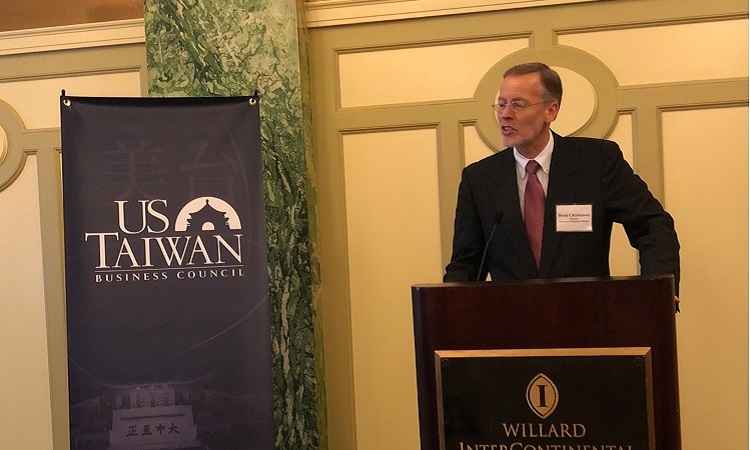OT-1938
June 10, 2019
Remarks by AIT Director W. Brent Christensen
at the U.S.-Taiwan Business Forum
U.S.-Taiwan Business Council/TECRO
June 10, 2019, 12:30
Willard InterContinental Hotel
(As Prepared for Delivery)
Minister Deng, Deputy Assistant Secretary Farrell, Senior Advisor Cornelius, Chairman Splinter, President Hammond-Chambers, ladies and gentlemen. Thank you for the invitation, I am looking forward to what should be an interesting discussion.
I am here in Washington this week with a diverse group of more than fifty Taiwan companies participating in the SelectUSA Summit. I am proud to say that for the second year running, it is also the largest delegation from any foreign economy to the SelectUSA Summit. The delegation includes both companies that are new to investing in the United States, but have had many years of success operating manufacturing facilities across Asia, and companies that have been investing in the United States for decades.
The delegation also includes companies producing a wide range of products and services, including firms from throughout the semiconductor ecosystem, companies involved in automotive supply chains throughout the world, and food and beverage firms.
I would like to take a moment to thank Minister Deng, whose team closely cooperated with our team at AIT to recruit a roster of very impressive Taiwan firms to join the SelectUSA Summit. The strong interest on the part of Taiwan firms in investing in the United States is not just a reflection of the U.S. market’s ability to attract business. It’s also a reflection of the strong interest and affinity between major businesses in both our economies.
As I am sure all of you know, this year marks the 40th anniversary of the Taiwan Relations Act. AIT is making a special effort to call attention to U.S.-Taiwan cooperation across a wide range of issues, including trade and investment. As we take stock of how far the relationship has come over 40 years, one thing is abundantly clear — Our cooperation with Taiwan is highly productive and it reflects our shared values: our belief in free and open markets, our faith in the rule of law, and the role of democracy in producing freedom and prosperity. These are values that we are keen to share with the rest of the world.
One of our signature programs in the U.S.-Taiwan relationship is the Global Cooperation and Training Framework (GCTF). The GCTF allows the United States and Taiwan to share and promote best practices in areas where we have mutual interests and significant expertise.
Since its launch in 2015, we have held 18 programs in Taiwan all attended by officials and experts from dozens of countries around the Indo-Pacific. This year alone, we have completed programs on network security, anti-corruption, and drug-resistant TB. Later this year, we will run programs on media literacy, cultural and indigenous language preservation, and energy security. As we begin to consider our programming for 2020 and beyond, we would welcome input from the U.S. and Taiwan business communities on future topics to highlight Taiwan and U.S. expertise to other Indo-Pacific economies.
Whenever I give speeches in Taiwan, I mention my four major policy priorities for my tenure as Director: promote U.S.-Taiwan economic and commercial ties; promote U.S.-Taiwan security cooperation; promote Taiwan’s role in the international community; and promote U.S.-Taiwan people-to-people ties.
I won’t discuss each of my four priorities today, but you’ll note that the first of my goals, economic and commercial ties, matches well with the goals of attendees here today. Obviously, all businesses are focused on their bottom line, but your work also brings the United States and Taiwan closer together. I am here to learn more, and I am looking forward to our discussion today.
















![Video Thumbnail [Recovered]-01](../wp-content/uploads/sites/269/Video-Thumbnail-Recovered-01-1-750x450.jpg)




